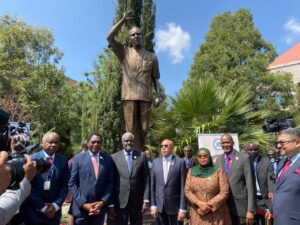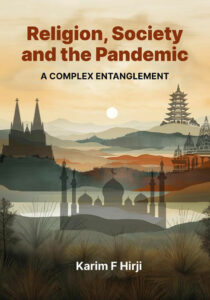by Ben Taylor
All aboard the electric train trials
The Tanzania Railways Corporation (TRC) commenced its inaugural trial journey of the electric Standard Gauge Railway (SGR) train from Dar es Salaam to Morogoro on February 26, 2024, as part of the implementation of an order by the President Samia Suluhu Hassan. She directed that by July this year, SGR train services from Dar es Salaam to Dodoma should have begun.
Chief Government Spokesperson Mr Mobhare Matinyi spearheaded a group of journalists and editors from various media houses as they boarded the coaches to enjoy and have firsthand information on the historic trial. Departing from the Tanzanite Station in Dar es Salaam promptly at 10:30 am, the train arrived in Morogoro at 12:50 pm amid a wave of enthusiasm.
The test marks a significant step forward in Tanzania’s efforts to modernize its transportation infrastructure and boost connectivity across the nation. The new line replaces the aged and less efficient meter-gauge railway system established during the colonial East African Railways.
The South Korean-made train, coupled with the Turkish/Chinese-built railway line, is poised to significantly reduce travel times and facilitate the efficient movement of goods and people. It is anticipated to be capable of reaching speeds of up to 160km per hour.
As trials for the standard gauge railway (SGR) electric train continue, TRC has said the process of setting fares for the service is still underway. “We at TRC have finished our part where we have submitted to the Land Transport Regulatory Authority (LATRA) everything that is needed,” said TRC Director General, Masanja Kadogosa. He said he understood that LATRA had already engaged in meetings with stakeholders in Dar es Salaam and Dodoma.
The proposed fares by TRC from Dar es Salaam-Morogoro are for the third class TSh 24,794 per adult, and TSh 12,397 for kids between the ages of 4-12. For Economy Class fares, the same route was TSh 29,752 per adult and TSh 14,876 for kids. These fares are subject to approval by LATRA.
Later, in April, TRC announced the arrival of the first ever Electric Multiple Unit (EMU) trains at the Dar es Salaam port, marking a significant leap forward for the project. This initial set consists of five electric locomotives and three passenger cars.
TRC said they expect to receive a total of 10 EMU sets, with the remaining units arriving monthly until October 2024. Additionally, they have already received 65 passenger cars and 9 electric locomotives, further bolstering their fleet.
Each EMU train can accommodate up to 589 passengers. The new units have prioritized passenger comfort with amenities such as Wi-Fi, designated seating for passengers with special needs, air conditioning, and CCTV cameras for enhanced security.
Once commissioned for service, the SGR trains will cut the time between Dar and Morogoro to around two hours, down from the current four-hour journey by buses and five hours by train on the old railway.
The 300km Dar-Morogoro line is the first phase of the SGR project, which is expected to run up to Mwanza on the shores of Lake Victoria and Kigoma on the northeastern shores of Lake Tanganyika in five phases. There are plans to add connections to Rwanda, Burundi and the Democratic Republic of Congo as part of the East African Railway Master Plan.
Phase two of the SGR project runs from Morogoro to Makutupora, covering 422 kilometres. The line is being extended to Tabora, 294km away in phase three. The fourth phase will link Tabora to Isaka, a 130km line, where it will branch to Mwanza and Kigoma.
Brief dispute between air traffic authorities in Kenya and Tanzania
For a few days in late January, a spat between air traffic authorities in Kenya and Tanzania caused a minor diplomatic incident, and flights were suspended.
Kenya denied Tanzania’s request for cargo flights by its carrier, Air Tanzania Company Limited (ATCL), between Nairobi and third countries. In response the Tanzania Civil Aviation Authority (TCAA) suspended all Kenya Airways (KQ) passenger flights between Nairobi and Dar es Salaam, effective January 22, 2024.
The TCAA cited the Kenyan authorities’ refusal as a breach of Section 4 of the Memorandum of Understanding (MoU) on Air Services signed between the two nations in 2016. This section stipulates reciprocal treatment for airlines of both countries.
The TCAA suspension of KQ flights never came into force, however, as the situation was resolved by the intervention of government ministers, including Tanzania’s Minister of Foreign Affairs and East African Cooperation, January Makamba.
“I spoke to my Kenyan colleague @MusaliaMudavadi. We agree that restrictions on air travel between our countries and from either of our countries to a third country shouldn’t stand. With the relevant authorities, we’ve resolved to settle this issue,” said Mr Makamba on X (formerly Twitter).
Zanzibar roll-on, roll-off ferries planned
Zanzibar port expects to develop a special berth for loading and unloading vehicles in what’s referred to as Roll-on, Roll-off (Ro-Ro) ferries. President Hussein Mwinyi in January witnessed the signing of an agreement for the project, which will be implemented through Public Private Partnership (PPP).
Dr Mwinyi described the project as a landmark in marine transport under the blue economy, adding: “A major reform and development in transport is inevitable, especially to achieve our goals. Improved transportation systems in road, water, and air are required for our social and economic growth.”
The signing ceremony was also witnessed by several executives, Ministers, and The Netherlands Ambassador to Tanzania, Mr Wiebe de Boer. The Ambassador said that relations between his country and Zanzibar have been growing stronger, where so far already there are 15 companies including KLM partnering in tourism and transport industries.
On his part, Zanzibar Minister for Infrastructure, Communication and Transport, Dr Khalid Salum Mohamed, noted the project will improve services at the current Ferry Terminal, and address passenger congestion and safety risks.
Air Tanzania fleet growth continues at pace
The government has continued with its efforts to uplift Tanzania’s aviation sector with the arrival of a brand-new aircraft for Air Tanzania Company Limited (ATCL) in early March. The aircraft, a Boeing 737-9 Max with a capacity to carry 181 passengers, brings the number of the country’s airline fleet to 15. The airline is expected to add one more Boeing 787-8 Dreamliner to its fleet before the end of the year.
Speaking during the reception to welcome the new plane, Prime Minister Kassim Majaliwa underlined the government’s commitment on continuing to strengthen ATCL and the aviation sector as key catalysts for economic growth. “The aviation sector is very important for development of our country, as it guarantees economic advancement. Globally, development of the economy has been influenced by the presence of a stable transport system, which boosts investment, protect capital and strengthen communication among traders and other service providers” Mr Majaliwa said.
Mr Majaliwa added that the government is undertaking major renovation of the JNIA Terminal 2 (the former international terminal), which upon completion will be destined as ATCL terminal, to cater for the Eastern and Southern Africa markets. Furthermore, he said the government is undertaking various airport construction projects in other regions, including Dodoma, Kigoma and Shinyanga, saying the plan is to ensure most parts of the country are accessible through air transport.
ATCL’s Managing Director, Engineer Ladislaus Matindi noted that the addition in the number of planes to the country’s airline has inspired many customers to prefer flying than ever before. He said that in the 2022/2023 financial year, the company’s planes carried over one million passengers, compared to only 160,000 in 2016/2017 when the government began engineering its revival. He said the airline currently serves 81 per cent of the local market.
Later, at the end of March, Air Tanzania launched direct flights between Dar es Salaam and Dubai in the United Arab Emirates (UAE). “Starting today, March 31, 2024, direct flights to Dubai will operate four times per week with the brand new and ultra-modern aircraft, the Boeing 737 MAX 9,” said Eng. Matindi.
The Dubai route will be the seventh international route to be launched by Air Tanzania. Other regional and international routes that have been inaugurated by the airline are Nairobi, Bujumbura, Lubumbashi, Entebbe, Ndola (Zambia), Johannesburg (launched in 2021, now suspended), Comoros, Harare, and Guangzhou.
Air Tanzania financial challenges continue at pace
Air Tanzania’s losses surged by 61% to TSh 56.64 billion in 2022/23 (USD $21m), compared to TSh 35.2 billion ($13.5m) in the previous year, according to Controller and Auditor General (CAG) Charles Kichere.
“The loss widened despite the fact that the company received government grants worth TSh 31.55 billion to boost its operations,” said Mr Kichere who handed the annual audit reports to President Samia Suluhu Hassan at State House.
According to the Transport ministry’s annual budgets passed by Parliament from the 2016/17 financial year to date, the government has spent at least TSh 3.63 trillion ($1.4bn) in reviving the airline during the last eight years.
TAZARA improvements planned
The World Bank has approved USD$ 270 million (approx. TSh 690bn) finance to support improvements in transport and trade connectivity between Zambia and Tanzania, including to the Tanzania-Zambia Railway (TAZARA). The money will be used to rehabilitate a portion of the TAZARA in Zambia, develop a modern border post between Zambia and Tanzania and introduce other supporting infrastructure.
The Minister for Foreign Affairs and East African Cooperation, Mr January Makamba, said that the project was one of the agenda when President Samia Suluhu Hassan’s visit to Zambia last year. “This is a much-needed boost to Tanzania-Zambia transport and trade connectivity, which was part of agenda of visit by President Samia to Zambia last year. Thank you, excellences, for your leadership on this important matter,” Mr Makamba wrote on his official X (formerly Twitter) platform.






